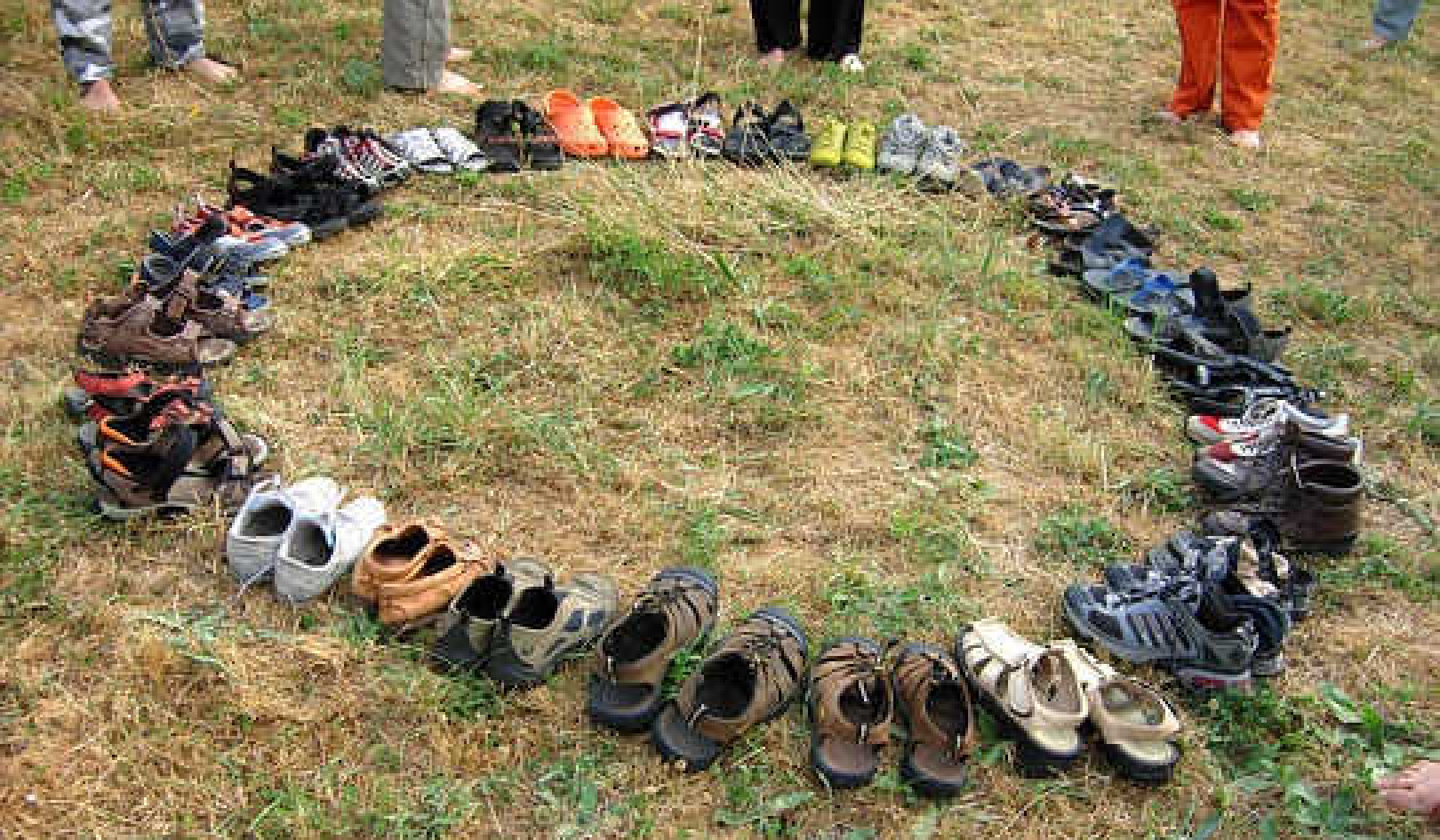
When I get pissed off at one of my clients I paint his face on a golf ball. You have no idea how good it makes me feel when I hit that damn ball.
-- A FORMER EMPLOYER
Everyone works with people they like -- and with people they dislike. We dislike some of them intensely. Seldom is there the luxury of working only with people who are friends or who are in total agreement with us. Given this situation, and because no one particularly likes pain, we tend to be kinder and more attentive to the people we like and to avoid as much as possible the people and situations we don't like. This is what usually keeps people from doing what is fair and/or what is in the best interest of those with whom they share their lives -- both friends and enemies.
An increased understanding of mental patterns and greater peace and harmony results in disliked people being treated more compassionately. But it would be a fairy tale to believe that just because people are better treated they will reciprocate. It would be an even greater fairy tale to believe that just because you are becoming a nicer person that suddenly the whole world will reciprocate. It just isn't so. The Dalai Lama was evicted from Tibet; the prisons of the world are full of holy people -- some of them imprisoned by other holy people. Nice people don't always win the lottery.
It is, simply, impossible to live in the real world and avoid interacting with difficult people. Since conflict cannot be totally eliminated, it is important to learn how to work in a less than perfect world; how to work with people it is not especially enjoyable and/or worthwhile to work with; and how to deal with conflicting wants and needs. The way to start is by taking a look at conflict.
The Essence of Conflict
Conflict arises totally from within. It happens because what is liked is clung to and what is not liked is rejected, be it a belief system, material objects, or emotional patterns. Conflict occurs when what is clung to or rejected is in opposition to what someone else is clinging to or rejecting. The magnitude of the conflict depends on how much and to what extent each person defends their position.
Conflict is all around us, on all levels. Even if you have no particular interest in pursuing global peace, and your thoughts don't extend much beyond the end of your driveway, there is still no escape from the problems of conflict. National borders aren't the only places where wars are breaking out; the conference rooms of everyday work lives are stuffed with conflict. So, rather than shy away from conflict, it is better to do something about it.
There are two directions in which to travel. You can work to reduce or change your own wants and/or work to reduce or change the wants of others. Much of what is called diplomacy is based on the latter: changing or reducing the wants of other people. Mediation is the fine art of getting both sides to reduce or change their wants.
Overcoming Your Own Belief System
As everyone knows, hindsight is 20/20. It would be wonderful if you could apply what you now know to your past. It would be even more wonderful if there were some mystical formula that could be looked up and applied to future conflict situations. Unfortunately, there are at least as many reasons for conflict as there are people. Life, fortunately, is not so simple nor so boring that responses can be codified in such a way.
There are, however, some common emotional patterns that run through conflict situations. By beginning to recognize the manifestations of these patterns in your own conflict situations, you can begin to construct the contents of a personal peace plan.
The first of these patterns centers on the relationship between conflict and a personal belief system. Everyone believes in something -- even if it's believing in nothing at all. These beliefs are held very strongly. People are quite often willing to fight for what they believe in. Their beliefs are invariably associated with strong emotions such as love and hate -- primarily emotions of intense clinging and rejection. They are, in effect, the manifestation of strong emotions as behavior patterns.
One of the strongest beliefs that is held is the belief in our own permanence and solidity. If your boss laughs at your very best idea for marketing the new line of cough syrup, you feel as if an inch of flesh has been carved from your chest. You are truly, mortally hurt; you are diminished; you are threatened; you fight back for your survival. If your name is mentioned by the vice president at the quarterly sales meeting, commending your efforts, you grow an extra two inches. You are enhanced; you expand. You will fight for the cause.
Belief systems bring enormous value to a life. They bring a sense of meaning and purpose. But they also carry with them the potential seeds for conflict, since each person's is slightly different. It can be difficult accepting the beliefs of everyone else. People usually want everyone else to share their beliefs. When this is insisted on, however, the seeds for conflict are planted.
Everyone has worked with people with strong beliefs, either in themselves or in some organization. Everyone has worked with people with lots of strong beliefs; people with opinions on everything from the punishment for taking the last cup of coffee to who should really be in charge of the master production schedule. Strong beliefs are manifested in a variety of ways.
Some people love to argue to the death for everything they believe in. Everything has to be a fight. Meetings with such people are sheer agony. Others seem to be in a continual state of suffering over their beliefs. Everything they believe in is being continually threatened. If there is no creamer at the coffee pot, it is a case of personal persecution and the world is thrown into a crisis for days. If someone wants to add an extra field to a report after the computer program is written, it is enough to fuel at least a week of personal suffering.
In each case, someone is right (me) and someone is wrong (you). Someone wins and someone loses. At least one person has defined "right" and "wrong" and at least one person has stepped over this self-defined boundary. Conflict is the only "solution".
Double-Edged Sword
Belief systems are double-edged swords. They can help us focus on the things that are really good in life and avoid getting caught in what is of questionable value. But a belief system can just as easily be detrimental to personal development. Clinging and rejecting prevent people from seeing and doing what is fair and in the best interests of everyone involved.
Focus on a conflict and examine it in terms of the beliefs that you held at the time when the conflict occurred. For most people, these beliefs were extremely solid. They probably still are. The design for the new order fulfillment system database was right; the customer service reps can't be allowed to make credit decisions; I knew, I knew, I knew . . . I knew that I was right and they were wrong.
Look at the nature of conflict in the light of your own quest for happiness. Examine your belief system in this light. Take a look at what you believe and why. Also take a look at how your beliefs affect those around you. As you do this evaluation, especially in the light of the suffering that your beliefs bring to you, you may find that some of your beliefs aren't as important as they used to be. You may actually stop believing that you are always right and that everyone else is always wrong. You may also find that the most important beliefs are those that bring people together -- not those that divide them.
Reprinted with permission of the publisher,
Park Street Press, a divn of Inner Traditions Intl.
©1999. http://innertraditions.com
Article Source
Enlightened Management: Bringing Buddhist Principles to Work
by Dona Witten and Akong Tulku Rinpoche.
 By applying Buddhist principles to the workplace the authors provide new insights into the true meaning of responsibility and the importance of focus. They teach how to relax under pressure and control emotions, and provide tips on constructive conflict resolution and understanding personal limits. More than just a book on achieving success, Enlightened Management is about creating happiness for all involved, employer as well as employee.
By applying Buddhist principles to the workplace the authors provide new insights into the true meaning of responsibility and the importance of focus. They teach how to relax under pressure and control emotions, and provide tips on constructive conflict resolution and understanding personal limits. More than just a book on achieving success, Enlightened Management is about creating happiness for all involved, employer as well as employee.
Info/Order this book.
About The Authors
 AKONG TULKU RINPOCHE is the president of ROKPA, an international relief organization. Visit ROKPA's website at http://rokpa.org. The author of Taming the Tiger, he is the founder and director of Samye Ling in Scotland, the oldest Tibetan Buddhist center in the West. Visit the Center's website at http://www.samyeling.org.
AKONG TULKU RINPOCHE is the president of ROKPA, an international relief organization. Visit ROKPA's website at http://rokpa.org. The author of Taming the Tiger, he is the founder and director of Samye Ling in Scotland, the oldest Tibetan Buddhist center in the West. Visit the Center's website at http://www.samyeling.org.
DONA WITTEN is a management consultant for Ernst and Young and has served in similar roles for major companies such as IBM and Cadbury.
More books by Akong Tulku Rinpoche
at InnerSelf Market and Amazon

























